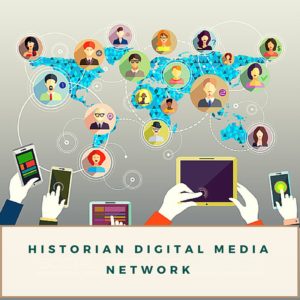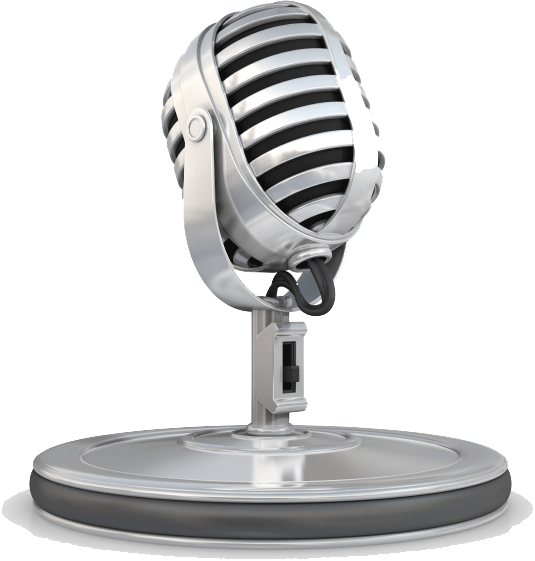 On March 3, 2016, I explored the idea of whether it makes sense to create a podcast network for historians. Eight weeks later, I am convinced that historians need a network. But we need more than a podcast network. We need a digital media network.
Presently, digital media consists of blogs and online magazines, podcasts, and on-demand video. In the near future, virtual and augmented reality devices will enhance each of these media types with immersive experiences.
On March 3, 2016, I explored the idea of whether it makes sense to create a podcast network for historians. Eight weeks later, I am convinced that historians need a network. But we need more than a podcast network. We need a digital media network.
Presently, digital media consists of blogs and online magazines, podcasts, and on-demand video. In the near future, virtual and augmented reality devices will enhance each of these media types with immersive experiences.
A digital media network offers historians the ability to cultivate and convey their work to wide and receptive public audiences. Digital media compliments books and articles by providing additional ways to disseminate ideas. A digital media network also provides historians with flexibility. Flexibility to present history in different media and flexibility to work in and develop new forms of media as they enter our digital world.
In this post, you will discover my plan to start a historian digital media network.
Overall Vision
If granted convenient access to the work of professional historians, the public will take an interest in history and historians’ work and become advocates for it. Convenient access to professional historical work will not only increase the ability of society to think historically, but having more advocates for history will help ensure that we have the funding we need for our research and the majors we need to keep our departments alive and fresh with talent.
The historian digital media network has a two-part mission: 1. To create wide public awareness about history and the work of professional historians by providing convenient access to history and historical research through digital media. 2. To educate historians how to use digital media to communicate history to people within and outside of the historical profession.
Plan of Execution
Given the rather large scope of this idea, I have been exploring models for how to execute it. The most promising models come from the technology sector.
Alphabet Inc.: This company made up of many companies started with just one company: Google, the wealthiest company in the world. Larry Page and Sergey Brin had big, long-term plans for what they wanted their business to do, but rather than execute all of their ideas at once, they started with one idea: how to improve people’s ability to search the internet.
Amazon: Today, Amazon stands as one of the largest logistics and technology companies in the world. But, before the company provided computing power on its AWS servers, warehouse and drop-shipping services, merchandise of all types, and digital media, Amazon.com provided one service: the ability to locate and purchase hard-to-find book titles.
Apple: Apple manufacturers high-quality computers and media devices and provides media delivery services. The second wealthiest company in the world started with three dudes in a garage who wanted to bring computers to the people. Their idea: shrink room-sized machines into personal, desktop kits.
All three of these companies are huge in size, scope, and profits. They achieved their success by starting off with one, small idea and executing that small idea well.
Similarly, I intend to start a historian digital media network with one, small idea and executing it well: podcasts.
Why Podcasts?
 Podcasts are hot right now.
Podcasts are hot right now.
Since my last post, Edison Research released its “Infinite Dial 2016” report. The study revealed a large increase in the number of podcast listeners and an increase in the number of podcasts people listen to. Additionally, The New York Times announced that it is creating an audio division, Audible.com (an Amazon company) released the beta for its new short-form audio service, and Google Play Music finally launched its podcast directory and service. I also intend to start the network with podcasts because, at the moment, it is the media I most enjoy learning more about, working with, and the one I am finding the most success with.
Starting a digital media network with just podcasts is also a large undertaking. Ideally, the historian digital media network will convey history from all periods and subfields. However, launching a network with one podcast from every period and subfield won’t work. We won’t be able to build the audience we need to sustain a network with such a diversified strategy at the start. Therefore, we must begin with an even smaller piece and work our way toward the end goal.
Where to Start?
Listeners patronize networks because they offer consistent content in terms of quality, topic, and release schedule. Listeners are more likely to tune in to new shows if they already know and like the hosts and content of the podcasts they listen to. Therefore, I imagine building the network up and out much like we convey narrative in survey courses.
The network needs to start with one historical period and subfield. It will start by offering content about early American history. Ben Franklin’s World will serve as the network’s first podcast. It will be the base from which we launch other programs. New programs will tie into and build off of the geography and period of early American history because this consistent and related content approach will encourage listeners to sample new network programs.
How to Add New Shows?
Building out the network comes down to two factors: Money and historians.
I cannot build this network alone. I have many ideas for shows and how historians can utilize digital media of all types to convey their ideas, but presently, I need to keep my focus on Ben Franklin’s World. Its quality cannot drop. It is the cornerstone of the network and we must not take its audience for granted. Ben Franklin’s World will not only help us build the audience for the historian digital media network, it will help us fund it.
Ben Franklin's World has grown to a point where I could seek the corporate sponsorship of companies like MailChimp and Squarespace. (I have a different strategy for how to monetize the podcast, but that must wait for another post.) Once I monetize Ben Franklin's World, we will have funds to invest into new shows, which will need webpages, hosting, artwork, audio engineers, software, and recording equipment.
Aside from money, the network needs people. Not only should the network provide a space where the public can hear many different historian voices, but the network needs the labor of many historians to exist. Podcasting is fun, but it is a labor-intensive media. Therefore, I need to find enthusiastic people who share in the vision of a historian media network and find ways to realize the second goal of the network: to educate historians how to use digital media to communicate history to people within and outside of the historical profession.
Ben Franklin’s World could be used as an educational tool. I am confident I could bring in historians and graduate students to work on the backend of the show to gain experience in digital media (podcasting requires knowledge of blogging and video too). As colleagues gain experience with Ben Franklin's World, we could work on ideas for shows they would like to produce and work on launching them.
However, this is easier said than done. I haven’t yet figured out how to effectively bring in people to work on Ben Franklin's World in a virtual setting. I can demonstrate many of the technical aspects of podcasting via a shared-screen video conference, but providing hands-on experience and in-person discussion would be difficult and this type of work is best performed with hands-on practice.
Hands-on practice with the technology and with communication is key as the network must offer high-quality content to realize maximum success. Anyone can podcast, but not everyone can produce a high-quality podcast. Hands-on experience is critical to learning the art of the latter.
First Steps
Clearly, I still have a lot of details to work out and thinking to do. But, I am going to start building the network as I work out those details. I will finalize and implement my monetization strategy for Ben Franklin’s World. I will build the network's website, the gateway to all network content. And, I will survey my audience to see what periods and areas of history they would like to discover more about.
Rome was not built in a day and this network won’t be built in a day either. It’s going to take years. But, I am confident we will sort out the details as we go and hopefully within a few years the network will start to resemble a broad, inclusive platform for the profession. A platform that will help us spread ideas, promote historical thinking, and create advocates who will help support and advance our work.
Network Name
The network needs a name. What do you think it should be?
I am sitting on a couple of domain names, but I would love to know what you think.